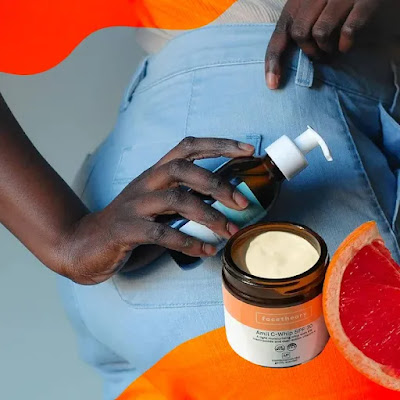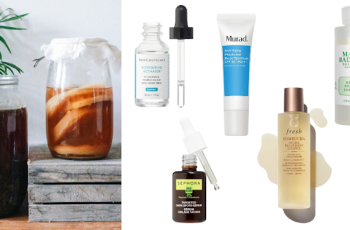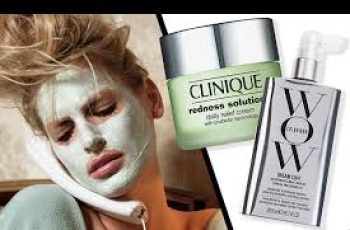How often can a Vitamin C serum be used?
Personally, I think everyone needs and benefits from a Vitamin C serum in their skincare routine. This is partly to do with the super healthy glow that the active ingredients give the skin, but it’s also to do with the many benefits it can offer. Because Vitamin C is a powerful antioxidant, this means it fights off a wide range of environmental influences that our skin is exposed to every day.
It’s important for the skin to maintain antioxidants throughout the day because it protects the skin’s lipid barrier from damage caused by free radicals from things like pollution, UV rays, central heating and harsh climates. When the barrier is well protected and functioning properly, you can reduce any issues that occur on the surface of the skin, such as fine lines, wrinkles, dark spots, hyperpigmentation and loss of elasticity. All of these
Vitamin C protects against oxidative stress throughout the day. Unlike other products like sunscreen, moisturizers and face oils, Vitamin C cannot be wiped off the skin, but works within the skin.
These aren’t the only benefits of Vitamin C. Here are some examples of other effects you’ll experience from using a Vitamin C serum.
Benefits of Vitamin C Serum
Helps reduce signs of premature aging like fine lines and wrinkles.
Helps wounds heal faster
Improve skin tone and brighten complexion
Increases collagen production for firmer-looking skin
Repairs and reduces signs of hyperpigmentation, sun damage and dark spots
Fights the effects of free radicals throughout the day
If you want to learn more about vitamin C and its benefits for your skin, check out our dedicated blog post on The Beauty Insiders.
Now let’s move on to how often you can use a vitamin C serum.
Can a vitamin C serum be used every day?
Of course, you can also use a vitamin C serum twice a day if you prefer. To get the most out of your vitamin C, it’s best to apply it to thoroughly cleansed skin after toning and before applying moisturizer and sunscreen. This ensures the active ingredients are able to penetrate the epidermis and stimulate collagen production and protect the outer barrier.
You’ll find that using a vitamin C serum twice a day doubles the free radical-fighting effects. Using it in the morning will prepare your skin for exposure to free radicals throughout the day. Using it afterwards during your evening routine will help repair and regenerate your skin while you catch up on your beauty sleep.
Can you overdo it with a vitamin C serum?
Yes, you can! Our skin behaves similarly to a wet sponge. What I mean by that is that, at a certain point, it can no longer absorb active ingredients. Therefore, it is best to use vitamin C products (especially serums, as they work deeper under the skin) only twice a day.
If you are worried that you are using too much vitamin C, your skin will be the first to tell you. You may notice an increase in blackheads, or the appearance of blackheads even though you didn’t have them before. You may also notice that your skin feels tight, irritated and itchy, and there are signs of redness and blotchiness on your skin. When using vitamin C for the first time, it is usually recommended that it is best to use it once a day to allow the skin to build up some tolerance and prepare for using it again in the evening.
Don’t forget: If you have any other concerns about using vitamin C, you can ask your doctor or dermatologist for further help to find the formula that works best for you and your skin.
How many times a week can a vitamin C serum be used?
Once your skin gets used to the vitamin C, you can apply it to your skin twice a day.
However, some users prefer to use it mainly in their morning routine to brighten the complexion and make the skin look healthy, radiant and refreshed. Additionally, some people with sensitive skin may wish to limit the frequency of application of this potent powerhouse to avoid unwanted skin irritation or reactions.
If your skincare routine includes a range of different active ingredients, you may want to alternate your use of Vitamin C throughout the week to avoid overloading your skin with ingredients like niacinamide, which can work against the Vitamin C and cause both ingredients to lose their effectiveness.
Can I use Vitamin C serum every night?
Yes, as I explained earlier, you can use Vitamin C serum every day once your skin has developed a tolerance. I also mentioned that many people prefer to use Vitamin C in their morning skincare routine to fully tap into their complexion’s radiance, but this is just a matter of personal preference, as this ingredient is very effective when used in both their evening and nighttime skincare routines.
Can I use Vitamin C twice a day?
Yes, you indeed can. In fact, some studies suggest that it’s best to reapply Vitamin C every eight hours for faster, more noticeable results. This is just a suggestion, and understandably out of reach for most of us.
I also believe that it’s always possible to have too much of a good thing, and reapplying Vitamin C can cause breakouts in acne and other forms of acne. Stick to using Vitamin C twice a day, but only if your skin is happy with it. If you are unsure, you can do a 24-hour patch test before applying it on your face to avoid any adverse skin reactions.
I hope I have answered your question about how often you should use Vitamin C serum in your skincare routine. If you still have any questions, visit us on Instagram.
DQH Knowledge drop: In your 20s, your skin cell turnover decreases. (Cell turnover is a key component in keeping your skin youthful.) You know what else slows down? Your collagen production. Starting in your 20s, collagen decreases by about 1 percent per year. Should you want to prevent fine lines and wrinkles, start by eliminating behaviors that contribute to premature aging. “If it’s bad for you, it’s bad for your skin,” says dermatologist Michel Somenek.
“Cigarette smoking reduces blood flow to the skin and causes premature wrinkling and a dull skin texture. Making the repeated pursed motion to inhale can also cause smoker’s lines. Alcohol and recreational drugs are toxins for the skin that damage its cellular structure and DNA,” Somenek tells us. “The faster you eliminate vices while you are young, the better chance your skin and body have to recuperate.” Also, adopting an anti-aging routine in your 20s is key. After all, the best offense is a good defense. We spoke to Somenek and experts Joshua Ross and Audrey Kunin to find out more.
Keep reading for the best anti-aging products for your 20s, according to skincare professionals.
Sunscreen
“We all know that the sun is the number one cause of skin aging and starting the prevention in your 20s is very important,” Ross says. “The majority of your sun damage won’t start to appear until you’re in your 30s, so don’t wait until you see it surface or you’ll be behind the curve. Stay ahead of it with a good-quality zinc-based sunscreen worn daily.”
Farmacy Green Defense Daily Mineral Sunscreen
An invisible sunscreen with SPF 30, plus botanical extracts meant to protect skin with tons of antioxidants. Bonus: It’s clean and fine to use under makeup.
Bareminerals Complexion Rescue™ Tinted Moisturizer Broad Spectrum SPF 30
Although we recommend you use your SPF and moisturizer separately, we also understand moments when you don’t have time or energy for that extra step. For those times, this bareMinerals moisturizer is a great thing to have on hand.
Vitamin C Serum
“A great introduction to anti-aging is to start with a vitamin C serum in your morning skincare routine,” Ross says. “It’s a powerful antioxidant that will neutralize free radicals and brighten the skin.” He adds that it’s a great way to counteract the effects of the sun’s harmful rays, which, as previously mentioned, are among the biggest causes of premature aging.
Drunk Elephant C-Firma™ Vitamin C Day Serum
The Drunk Elephant C-Firma is a lightweight serum that promises to give skin a glow by combining the brightening powers of vitamin C with ferulic acid, l-ascorbic acid, and vitamin E. The included sodium hyaluronate is meant to replace hydration loss, so you shouldn’t have to deal with any irritation.
Sunday Riley C.E.O. Rapid Flash Brightening Serum
This potent serum is jam-packed with vitamin C (15 percent, to be exact), which means it’s a potential superstar at both brightening skin and dousing it in antioxidants.
Peptides
Using peptides on your skin has many benefits, says Somenek. “The skin barrier is what defends the body against pollution, UV rays, bacteria, and toxins. It can be damaged by several everyday factors. Using topical peptides aids in building a stronger barrier,” he says. “Peptides comprise elastic fibers, which are a type of protein. These fibers help to make skin appear taut and firm. Peptides can also help repair damaged skin, relieve inflammation, and even out skin tone. Some peptides can kill acne-causing bacteria that is common in 20-somethings.”
Kunin agrees, saying, “Peptides are an excellent entry point for supporting collagen.” She recommends looking for face and eye treatments that contain these collagen-boosting powerhouses.
Charlotte Tilbury Magic Eye Rescue Cream
This Charlotte Tilbury super-emollient eye cream has a base of coconut oil and shea butter (read: it’s incredibly hydrating). Botanicals plus peptides are meant to help reduce dark circles and boost collagen, respectively.
This creamy moisturizer serves up potent collagen-boosting peptides and pycnogenol, and antioxidant-rich vitamin C. “Instead of sitting on top of the skin, peptides penetrate the outer layer so they go deep. The ‘signals’ they send tell the cells to produce elastin and collagen, which are needed for youthful-looking skin,” explains Somenek.
At-Home Peel Pads
Remember that skin cell turnover fiasco we talked about earlier? One way to help support it is by exfoliating. “Exfoliation is important to help keep skin fresh and luminous,” Kunin says. She recommends using at-home peel pads as an easy and effective way to exfoliate.
“The goal in your 20s is to fight the slowing pace of cell turnover. It is wise to use products that gently exfoliate, yet still remove oil and other impurities. Products that have Alpha Hydroxy Acids (AHA) or Beta Hydroxy Acids (BHA) are a good choice.”
According to Somenek, you should only exfoliate two to three times a week. “People of all ages are guilty of over-exfoliating and that can be too much of a good thing,” he says.
Dermadoctor Kakadu C Intensive Vitamin C Peel Pad
A few swipes of this Derma Doctor powerful peel pad promise to leave your skin glowing and smooth, thanks to the seven (yes, seven) types of chemical exfoliants, including AHA and BHA. It also contains vitamin C via Kakadu plum extract for added brightening and antioxidant protection.
KEY INGREDIENTS Kakadu plum extract is sourced from the Kakadu plum, a fruit grown in northern Australia. It contains vitamin C, which restores the skin’s natural barrier, increases collagen production, and soothes irritation.
Dr. Dennis Gross Skincare Alpha Beta® Universal Daily Peel Pads
These are the gold standard of peel pads, with a cult following and over 900 five-star reviews on Sephora. They’re easy to use and contain a blend of anti-aging exfoliating acids.
Emollient Night Cream
“In your 20s, you need to start upping the hydration in your skincare routine. You may have been cautious of over-moisturizing because of acne in your teens, but as you enter your 20s, your skin transitions and becomes drier,” Ross says. “I recommend an emollient night cream added into your evening skincare regimen.”
“Twenty-somethings need to make sure that they are not using creams that will clog their pores and cause excess oil production,” says Somenek. Opt for non-comedogenic products.
Cerave Skin Renewing Night Cream
One great choice is the CeraVe Skin Renewing Night Cream, which is a non-comedogenic night cream that leaves skin soft and glowy. It combines the moisturizing powers of ceramides and hyaluronic acid.
RoC Retinol Correxion Max Hydration Creme
“The best night cream ingredients contain retinol, benzoyl peroxide, and/or salicylic acid or hyaluronic acid. The goal is to moisturize, yet remove excess oil,” says Somenek. This Roc Retinol Correxion cream fits the bill as it contains both hyaluronic acid and retinol so it promises to moisturize while also being non-comedogenic.



